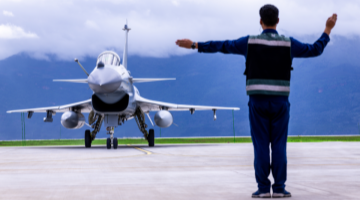By Kang Jie
康 杰
On June 24th, the NATO summit kicked off in The Hague, the Netherlands, with the increase in defense spending by member states emerging as the central topic of discussion. According to The Hague Summit Declaration, NATO member countries pledged to raise their annual defense spending to 5% of GDP by 2035. Of this, 3.5% will be allocated to core military expenditure, while the remaining 1.5% will go to critical infrastructure protection and cyber security.
6月24日,北约峰会在荷兰海牙开幕,提升成员国国防支出成为峰会的核心议题。根据峰会宣言,北约各国承诺在2035年前将年度国防开支提高至国内生产总值(GDP)的5%。其中,3.5%用于核心军费支出,1.5%用于关键基础设施防护和网络安全等。
Ahead of the summit, NATO member countries convened in London on June 10 and agreed to push forward with a major military buildup. At that meeting, NATO Secretary General Mark Rutte called on member countries to shoulder greater defense responsibilities in order to offset the financial pressure caused by the strategic retrenchment of the US. He proposed a 400% increase in air and missile defense capabilities, as well as the procurement of additional armored vehicles, artillery systems, drones, and at least 700 F-35 fighter jets.
此次峰会召开前的6月10日,北约国家还在英国伦敦举行了一次会议,决定大力扩军。北约秘书长吕特在会议上要求成员国承担更大国防责任,以分担美国战略收缩带来的军费压力,提出要将防空和导弹防御能力提升400%,增购更多装甲车辆、火炮、无人机和至少700架F-35战斗机。
Judging from the information released at the two meetings, NATO's military expansion plans are clearly aligned with US demands, but for European countries, they amount to economic overreach. The Trump administration has repeatedly pressed other NATO member countries to raise their annual defense spending to 5% of GDP, asserting that Europe should not be free-riding on US defense efforts. Such an approach has sparked strong dissatisfaction among many allies.
从这两次会议透露出的消息看,北约扩军计划充分迎合了美国要求,但对欧洲国家而言则是经济透支。特朗普政府一直强硬要求北约其他成员国把年度国防开支提高至占GDP的5%,声称不能让欧洲在防务问题上“搭美国的车”,这引发诸多盟友强烈不满。
Among NATO's 32 member countries, only 23 are expected to meet the target of allocating 2% of GDP to defense spending in 2024. Although a consensus was ultimately reached at the summit in The Hague, significant divisions remain within NATO regarding how to realize the more ambitious 5% goal. Some member countries believe that achieving this target will pose considerable challenges. Spain has pledged only to raise its defense spending to 2.1% of GDP in the coming years. Slovakia stated that it reserves the right to independently determine how to meet its defense spending commitments. Belgium also expressed the view that it is unrealistic to substantially increase military expenditure in the short term. Meanwhile, Donald Trump asserted that the US is not obliged to meet the 5% target, while demanding other allies to fulfill their commitments.
北约32个成员国中,只有23个成员国在2024年实现了国防开支占GDP2%的目标。尽管海牙峰会最终达成共识,但北约内部在如何实现占GDP5%的目标上存在分歧。部分成员国认为实现5%的目标存在较大困难。西班牙仅承诺未来将国防开支提升至GDP的2.1%;斯洛伐克表示保留自主决定如何实现军费支出目标的权利;比利时也认为短期内大幅增加军费不现实。特朗普则声称,美国无须遵守5%的目标,但同时要求其他盟国必须履行义务。
At present, most NATO countries are grappling with economic and fiscal challenges. Nick Witney, a senior policy fellow at the European Council on Foreign Relations (ECFR), warned that excessive and rapid increases in defense spending could have a significant impact on the economic and political stability of European countries. Public concern is mounting across Europe over the rising military expenditure crowding out investment in public welfare. Discontent and frustration have led many people to walk to the streets in protest, voicing strong opposition to military expansion and calling for the protection of social services.
当前,多数北约国家面临经济和财政困境。欧洲对外关系委员会高级政策研究员尼克•威特尼说,国防支出过多过快将对欧洲国家经济和政治稳定带来巨大影响。欧洲多国民众对军费飙升挤占民生投入的担忧与日俱增,愤怒和不满让很多人走上街头抗议示威,强烈反对军事扩张,呼吁保障社会福利。
In this new round of NATO military expansion, the US military-industrial complexes stand to benefit the most. Some estimates suggest that if European countries broadly meet the newly announced defense spending target, the additional annual outlay would amount to an astronomical figure. Among the priority investment areas of the expansion initiative, air defense systems have been given particular focus, with procurement costs for related projects expected to reach tens of billions of US dollars.
北约新一轮军事扩张计划中,美国军工复合体将成为最大受益者。有人算过,欧洲若普遍达到峰会宣布的国防开支目标,每年额外投入的军费将是一个天文数字。此次扩军行动中,防空系统建设被列为优先投资领域,相关项目采购金额预计高达数百亿美元。
It is learned that a total of 24 European countries have joined the German-led European Sky Shield Initiative (ESSI) since its launch in October 2022. However, in 2024, the contracts for the first batch of projects under the initiative were awarded to a joint venture between the European group MBDA and US defense contractor Raytheon. Some media outlets have noted that while European countries are investing heavily under the banner of enhancing defense autonomy, they risk becoming overseas manufacturing bases for the US military industry in reality. US arms giants such as Lockheed Martin and Boeing have long been poised to feast on this opportunity, one ultimately paid for by European taxpayers. Analysts point out that the increase in defense spending is less about enhancing Europe's independent defense capabilities and more akin to an unprecedented, large-scale transfer of wealth to the US.
据了解,2022年10月由德国主导的“欧洲天空之盾倡议”,已有24个欧洲国家加入。然而,2024年该倡议的首批项目合同却由欧洲导弹集团与美国雷神技术公司的合资企业斩获。有媒体分析认为,欧洲国家投入巨资,表面上是在推进自主防务建设,实则沦为美国军事工业的海外生产单元。洛克希德•马丁、波音等美国军火巨头,早已张开饕餮之口,等待由欧洲纳税人买单的“盛宴”。分析人士称,提升国防开支与其说是欧洲自主防务能力的提升,不如说是一场规模空前、定向输美的财富转移。
Since Donald Trump's return to the White House, relations between the US and the EU have been severely strained and Europe is now acutely aware of the US's unpredictability and unreliability. On the issue of NATO, what the US truly seeks is to maximize its hegemonic interests at the lowest possible cost, whereas what European countries are concerned with is establishing a secure strategic environment and achieving strategic autonomy. A recent editorial in The Guardian noted that the NATO summit's consensus on boosting defense spending represents, for Europe, both an investment to keep the US engaged and a pre-emptive move to fill the funding gap in anticipation of a potential US withdrawal. Many military experts have warned that such a dramatic surge in NATO military expenditure could trigger a new arms race, which would ultimately make Europe less secure. Kremlin spokesman Dmitry Peskov expressed warning that NATO and Europe are heading down an increasingly unrestrained path of militarization.
特朗普重返白宫以来,美欧关系极度震荡,欧洲早已清楚美国的反复无常和不可靠。在北约问题上,美国真正关心的是如何以最低成本谋求自身霸权利益最大化,而欧洲国家关心的则是如何拥有安全的战略环境并实现战略自主。英国《卫报》一篇社论指出,北约峰会就提升国防支出达成共识,对欧洲而言,这既是一项拉住美国的“投资”,也是为应对美国抽身而预先“弥补资金缺口”。有不少军事专家认为,北约如此规模的军费增长可能会引发军备竞赛,反而让欧洲更加不安全。俄罗斯总统新闻秘书佩斯科夫警告,北约和欧洲正走在不受约束的军事化道路上。
(The author is from China Institute of International Studies )
(作者单位:中国国际问题研究院)













